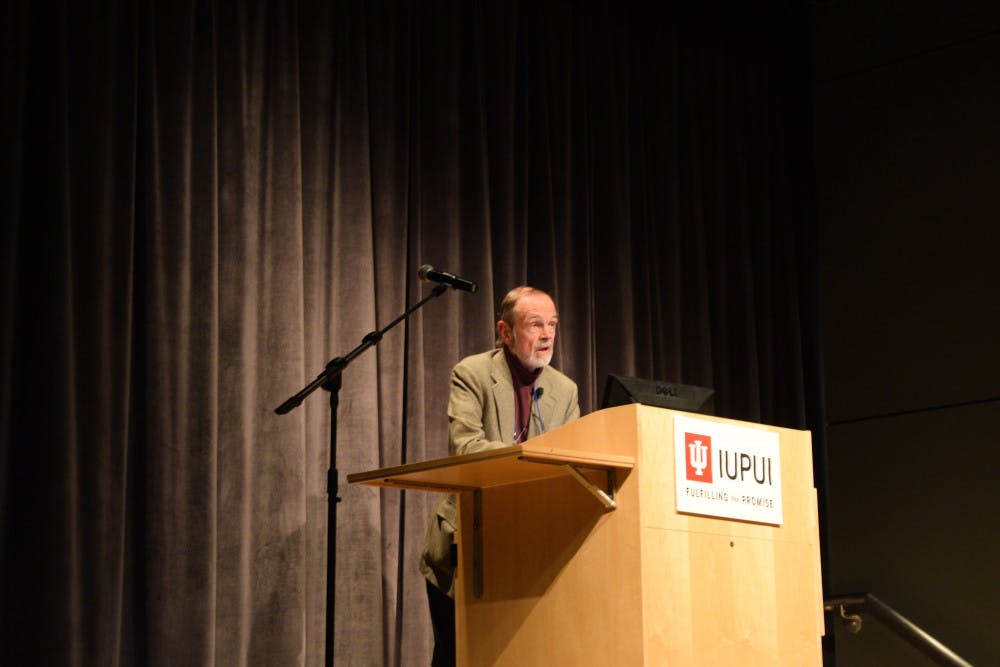I don’t like to advertise that I’m atheist. Not because I feel threatened by religion, but because the loudest atheists, like Richard Dawkins, give the rest of us a bad reputation. Rather than battle conservative Biblical literalism, New Atheists typically stigmatize religion wholecloth.
But not all secular people are like this. As Dr. Philip Kitcher described in his lecture “Religious Progress and Humanist Hope,” there is a need to decouple morality from religion, and a way to not be a New Atheist about it.
IUPUI’s department of philosophy facilitated this lecture as part of a series of groups and lectures on secular humanism for the past three years.
Secular humanism is an umbrella term for secular beliefs that have grown in response to dominant Christian perspectives. The most prolific secularists are the New Atheist type: doggedly, obnoxiously concerned in proving belief wrong.
“What other secular humanists are doing, and Kitcher is one of them, is they try to reconcile more progressive strains within Christianity and other mostly monotheistic religions and combine them with a more secular viewpoint,” Dr. Cornelis De Waal, professor of philosophy at IUPUI, explained. I had never heard this term before.
I found Kitcher’s lecture to be comprehensive and a lot to take in. In essence, it’s fine to believe in and worship a creator, but uncritically following tenets written millenia ago is dangerous.
Kitcher compared a literalist fanatic to a commandant in a fascist regime. He said that ancient “tribal” gods, like the God of the Old Testament, were “vindictive narcissists” who sanctioned slaughter and slavery. Moral standards cannot be pulled from these texts.
Kitcher’s model for how religions “progress from, not progress to,” was interesting. As believers accept religious diversity, they shift away from ancient texts and start “using a filter to screen out the bits that violate their moral sensibility.” Flexibility, nuance, and tolerance eventually arrive.
Kitcher decried New Atheism as privileged and unconcerned with structural inequality that stems from religious-based morality, like homophobia and misogyny. They also

don’t give credit to progressive, pro-human religious endeavors.
“To say there is no god is one thing. To reject all religion and everything that comes out of the tradition as being hopelessly implicated as a result of that is quite different,” De Waal said.
Following the lecture, Andrea Jain, an assistant professor in the department of religious studies, voiced criticism that Kitcher’s perspective was narrow and limited to a view of religious progression that was white, patriarchal, and Protestant.
“I felt like the paper was lacking somewhat in the knowledge about the variety of religious lives,” she said. Many contemporary tribal religions do not rely on texts, she said, and progressive religion often comes from radical social movements.
I agreed with her. Kitcher’s use of the word tribal was loaded, and he agreed, too. His model of religious progression was a narrow analysis of Abrahamic religion, but I walked away feeling it could be applied to other contexts.
At its core, I found reassurance in Kitcher’s call for secular humanists to better align ourselves with progressive religious people. I walked away feeling empowered knowing there is a nuanced way to be a non-believer.
“Religious traditions and their secular counterparts are incomplete,” Kitcher said. “What matters is improving people's lives.”
How I Learned I’m a Secular Humanist

Heads up! This article was imported from a previous version of The Campus Citizen. If you notice any issues, please let us know.
Professor Andrea Jain poses a question at Dr. Philip Kitcher's lecture “Religious Progress and Humanist Hope.” Photo by Paris Garnier.




